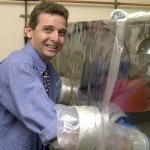



Poultry CRC Develops Reliable Tools for Industry
AUSTRALIA - The temperature of litter composting and its effects on viral pathogen survival are being studied at Poultry CRCin order to develop models that companies/growers can use to achieve predictable and measurable outcomes.
With an increasing cost of litter material coupled with an increase in public awareness of litter re-use issues (particularly pathogen load), the poultry industry is challenged on how to best manage this potential resource.
A previous Poultry CRC project undertaken by Professor Steve Walkden-Brown (project 06-15) at UNE focused on viral pathogen survival in multiple batch litter use by broilers. Experiments, using a novel bioassay, investigated pathogen survival in litter over time; to semi-quantify survival rates of pathogens with temperature. This research showed that chicken anaemia virus, infectious bursal disease virus and fowl adenovirus serotype 8 infections were readily transmitted in litter, but infectious bronchitis virus and Newcastle disease virus were poorly transmitted via litter.

This project, in collaboration with CSIRO's Dr Peter Hunt, will investigate viral pathogen survival in composted litter over time and in relation to temperature. The ultimate potential benefit is to develop good temperature/time relationships of common viral pathogen survival rates in compost, leading to a higher level of litter reuse without some of the risks associated with it. This will also have the benefit of reducing costs of production and, by utilising this resource to full potential, a smaller ecological footprint for the industry.
Professor Walkden-Brown explained: "We will determine whether molecular tests will mimic pathogen survival curve from prior bio-assay work (project 06-15) and a rapid decay of viral load in bioactive, composting conditions will occur. We will also develop Standard Operating Practices (SOP) for litter composting. i.e. predictive outcomes at certain composting temperatures, resulting in the development of reliable models that companies/growers can use to achieve predictable and measurable outcomes."
The Commercial Manager of the Poultry CRC, Lloyd Thomson, said: "Waste stream mitigation is a major commercial challenge for the Poultry CRC, and this project will tackle part of this important issue facing the poultry industries in the face of an ever increasing urban sprawl and a more stringent regulatory environment."








